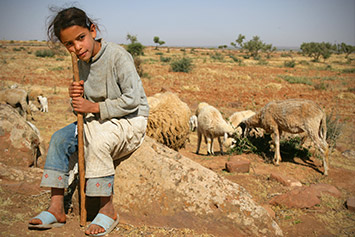World Day against Child Labour 2016
Let's say ‘No’ to refugee children forced to engage in child labour activities.

A staggering 168 million children are engaged in child labour globally. This means that all economic activity, from agriculture to manufacturing, from services to construction, may involve child labour at some point in the process. This is why employers, with unions and labour inspection, must be vigilant to ensure that supply chains are free from child labour. While most child labour occurs in production for domestic markets, children can also be found working in the production of goods and services for export.
The focus of the 2016 World Day Against Child Labour is on child labour and supply chains. According to the International Labour Organisation, child labour occurs largely in the rural and informal economy, in areas where trade unions and employers’ organisations are often weak or absent. Inadequate education systems also heighten the risk of child labour being used, so governments must step up their efforts to provide free quality public education for all.
EI sponsors initiatives with the Governments of Mali and Uganda to improve the training of teachers to increase the quality of education, thereby preventing school drop out and child labour. EI capacity building programmes in Nicaragua and Zimbabwe are also successful in training teachers to become agents of change. Dozens of child labourers have already returned to schools in those countries.
The Education International (EI) General Secretary, Fred van Leeuwen, says that “EI is also very concerned with the increasing number of refugee children being subjected to child labour, prostitution, or early marriage in host countries, like Lebanon, Jordan, or Turkey.” He notes that, due to migration, conflicts and crises, tens of thousands of children, including refugee children, are deprived of quality education. Many of them are forced to engage in child labour activities to survive.
Highlighting the 2013 UN Brasilia Declaration on Child Labour, van Leeuwen stresses the need to promote decent work; free, compulsory and quality education for all children; and the progressive universalisation of social protection. He is also calling for engagement in social dialogue to obtain decent work and quality training and in-service development for teachers and other social personnel.
“Eradicating child labour, as well as ensuring quality education and decent work for adults, are key objectives of the Sustainable Development Goals (SDGs) adopted by the UN in September 2015, especially SDG 4 on ensuring inclusive and equitable quality education and promoting lifelong learning opportunities for all,” van Leeuwen adds.
As child labour not only deprives children of their right to education and protection from exploitation, but also has broader consequences for national development, its complete eradication constitutes an important issue for development and human rights, he says.
Van Leeuwen notes that donor governments have stopped contributing financially to education through development aid or have drastically reduced their contribution despite pledges. Therefore, EI is calling on the Commission on Financing Global Education Opportunities to ensure that all children in the world are in school and learning. This must be achieved by earmarking US$39 billion per year between 2015 and 2030, the sum estimated by UNESCO to achieve sustainable funding for global education. The Commission will make recommendations to the UN Secretary-General in September 2016.
Source: Education International
- 336 reads
Human Rights
Ringing FOWPAL’s Peace Bell for the World:Nobel Peace Prize Laureates’ Visions and Actions

Protecting the World’s Cultural Diversity for a Sustainable Future

The Peace Bell Resonates at the 27th Eurasian Economic Summit

Declaration of World Day of the Power of Hope Endorsed by People in 158 Nations

Puppet Show I International Friendship Day 2020

